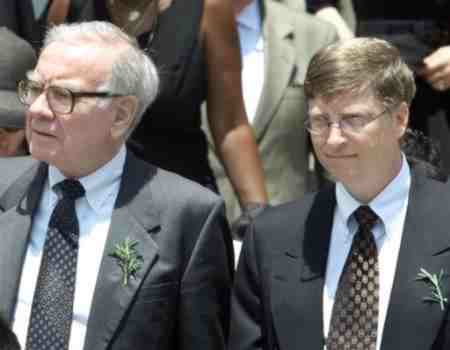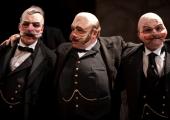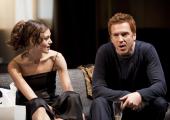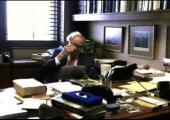If you’d invested a thousand dollars with Warren Buffett in 1965, your stake would have grown to more than than five million bucks today. If the UK had followed one of Buffett’s golden rules of investment – Don’t Get Into Debt – our clapped-out rust-bucket of a nation might now feel like a very different place. Buffett's take on debt is that "if you're smart you don't need it, and if you're dumb you've got no business using it," which Gordon Brown should have etched on the inside of his glass eye.
On the other hand, if everybody copied Warren Buffett’s diet, which consists of T-bone steaks, cherry Cokes, chocolate sundaes and peanuts – apparently he’s “uncomfortable with most vegetables” - most of them would already be dead or not feeling very well.
Evan Davis’s film about Buffett, the so-called Oracle of Omaha, was a gently quizzical piece of work about the man who slugs it out every year with his good friend Bill Gates for the title of Richest Man in the World. But somehow you felt – and the wry smile on Davis’s face suggested that he felt it too - that giant chunks of the jigsaw were missing from a story that seemed to suggest that you could become the wealthiest person on the planet by following a few commonsense rules and being polite to everybody. Though come to think of it, maybe not many have tried it.
Davis opened with scenes from the AGM of Buffett’s Berkshire Hathaway operation, his holding company which controls assets worth $267bn. Every year thousands of investors descend on Buffett’s home town of Omaha, Nebraska, and crowd into a local sports arena to see a film about the company’s performance and ask questions from the floor. The mood rarely turns ugly since Berkshire Hathaway has been returning annual profits of more than 20 per cent for decades. Then they go and eat steaks and burgers, and maybe get to hear Warren play his ukulele with a Country & Western band.
 Nobody speaks of ill of Buffett, except the people who got sacked by his hired hard man Harry Bottle after Buffett bought a Nebraska steel mill during the Sixties. Warren asset-stripped the company and sold the profitable bits, but apparently hated being unpopular so much that he vowed never to behave like a cartoon Wall Street capitalist again. Nowadays, all anybody will say about him is that he's a regular guy, he made them incredibly rich, he's the world's greatest investor, and they love him to bits. He gave $31bn to the Bill and Melinda Gates Foundation (Buffett and Gates pictured right) and believes that bankers don't deserve gigantic bonuses, so he's pretty well indemnified against accusations of rapacious fat-catism.
Nobody speaks of ill of Buffett, except the people who got sacked by his hired hard man Harry Bottle after Buffett bought a Nebraska steel mill during the Sixties. Warren asset-stripped the company and sold the profitable bits, but apparently hated being unpopular so much that he vowed never to behave like a cartoon Wall Street capitalist again. Nowadays, all anybody will say about him is that he's a regular guy, he made them incredibly rich, he's the world's greatest investor, and they love him to bits. He gave $31bn to the Bill and Melinda Gates Foundation (Buffett and Gates pictured right) and believes that bankers don't deserve gigantic bonuses, so he's pretty well indemnified against accusations of rapacious fat-catism.
The closest anyone got to explaining how Warren accomplished all this was to say that "it was simple, but not easy." Apparently he read a couple of influential books at an early age, a thing called The Intelligent Investor and Dale Carnegie's How To Win Friends And Influence People, and he developed a knack for spotting undervalued shares and buying them for a pittance. Later he took to buying entire companies, often homely mom-and-pop operations in which he detected underlying value. His down-home charm and delightfully unthreatening manner often helped him to pay well under the odds. He also likes buying insurance companies, which offer large cash floats he can invest in other companies.
He once declared that derivatives, those dangerously unstable betting instruments that almost destroyed the global financial system, were "weapons of financial mass destruction", but Davis unearthed the intriguing news that Buffett now regularly trades in them, profitably of course. Since another of his golden rules is that you should only deal in things you can understand, that means folksy, homespun ol' Warren is not only a very smart bunny, but also an exceedingly dark horse.










 Nobody speaks of ill of Buffett, except the people who got sacked by his hired hard man Harry Bottle after Buffett bought a Nebraska steel mill during the Sixties. Warren asset-stripped the company and sold the profitable bits, but apparently hated being unpopular so much that he vowed never to behave like a cartoon Wall Street capitalist again. Nowadays, all anybody will say about him is that he's a regular guy, he made them incredibly rich, he's the world's greatest investor, and they love him to bits. He gave $31bn to the Bill and Melinda Gates Foundation (Buffett and Gates pictured right) and believes that bankers don't deserve gigantic bonuses, so he's pretty well indemnified against accusations of rapacious fat-catism.
Nobody speaks of ill of Buffett, except the people who got sacked by his hired hard man Harry Bottle after Buffett bought a Nebraska steel mill during the Sixties. Warren asset-stripped the company and sold the profitable bits, but apparently hated being unpopular so much that he vowed never to behave like a cartoon Wall Street capitalist again. Nowadays, all anybody will say about him is that he's a regular guy, he made them incredibly rich, he's the world's greatest investor, and they love him to bits. He gave $31bn to the Bill and Melinda Gates Foundation (Buffett and Gates pictured right) and believes that bankers don't deserve gigantic bonuses, so he's pretty well indemnified against accusations of rapacious fat-catism.